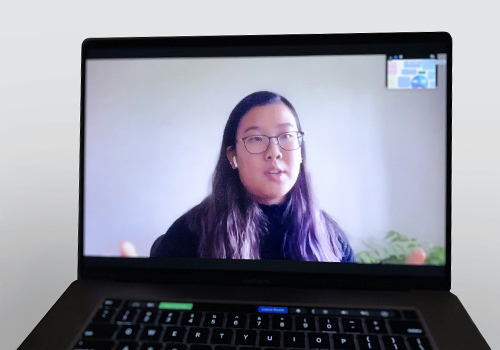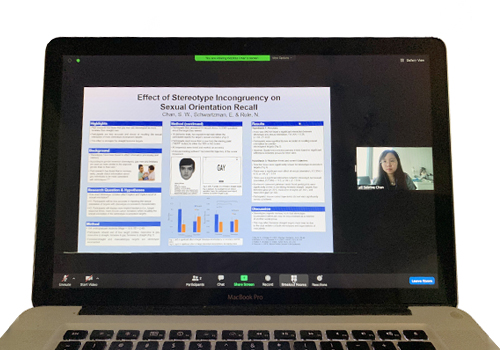Arts & Science undergraduate research was on display last week, with the Research Opportunities Program’s first online poster fair.
Eighteen students showcased just some of the projects completed this past summer. The students presented their research and shared their insights with 185 attendees who made their way through 14 virtual breakout rooms, learning about the innovative research taking place in fields like linguistics, psychology and computer science.
The Research Opportunities Program (ROP) gives undergraduate students the chance to join a professor’s research project and earn course credit towards their degree and program requirements.
Students learn practical research methods and develop relationships with faculty members who act as mentors during their undergraduate years and can assist them in applying to graduate schools or professional Faculties.

Angela Gong, a third-year student studying ecology and evolutionary biology and a member of Trinity College, presented her poster, “The Role of Policy in Developing Sustainable Urban Agriculture in Toronto.”
Her research explored sustainable urban agriculture (SUA) which she believes can offset the environmental impacts of cities, supply food with minimal natural resource disruption, alleviate pressures on rural agriculture, and benefit local communities and economies.
She found that while governments recognize the benefits of SUA, there’s a lack of political will, land is not available to populations who would benefit the most from urban growing, and there is persistent confusion around the roles of government and community in supporting SUA.
Her conclusion: developing SUA will require clearer laws and standards across all levels of government to increase accessibility, expansion and tenure of SUA projects in Toronto.
“Sustainable urban agriculture is such an important way to combat climate change, and I was glad that so many other students, faculty and staff were interested in learning more about food policy and urban growing,” she says.
“I really enjoyed interviewing and working with so many people in food system research, activism and production, and finding common ground in building a more resilient and sustainable food system from all these angles. Research like this helps me to learn what I'm interested in and decide what kind of career I would like to pursue.”

Clare Jiachun Zhang, a member of Victoria College, is a fourth-year student enrolled in the psychology specialist program.
Her research investigated generosity in young children ages 3-5. “The research question we are trying to investigate is: can young children detect needs in others and overcome personal cost to produce helping behaviours?” she says.
Zhang conducted games — initially in-person then shifting to an online format because of the COVID-19 pandemic — where kids were assigned an object or character and were required to clap in order to move their objects across a board.
Helping behaviours were measured through monitoring the kids’ efforts in clapping to move not only their own character, but the characters of other kids as well.
“We came up with different ways and designs to assess helping behaviour online,” says Zhang. “The process was a hard but creative one, I enjoyed trying out different ways and methods to test kids online.”
Her research found that young children can detect other’s needs and overcome personal cost to produce helping behaviours, and that personal cost influences their helping behaviour — they help less when the personal cost is high.

Grateful for the experience, Zhang says, “Research like this allows me to work in a lab setting and familiarize myself with the experiment process, since experiments are not the only component of a research. Designing paradigm, discussing with lab members, listening to feedback, modifying the paradigm, recruitment of participants — all these steps are crucial to successful research and I learned a lot from them.”
“I love the chance to learn a few new things,” says Asher Cutter, interim associate dean, student affairs, in the Faculty of Arts & Science and a professor of Ecology & Evolutionary Biology who spoke at the event.
“I've been an academic for a long time and it’s still really fun to have students present who are experts in fascinating subjects outside of my discipline of genetic biology,” he says, noting past ROP students have worked in his lab for years.
“Insights from this wide range of fascinating subjects is one of the big perks we get by having this amazing diversity of expertise here in Arts & Science.”

